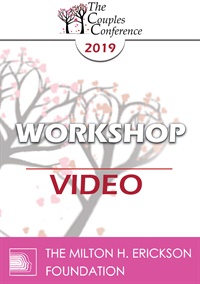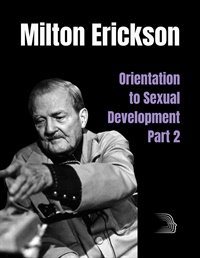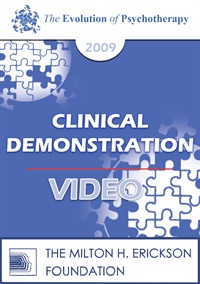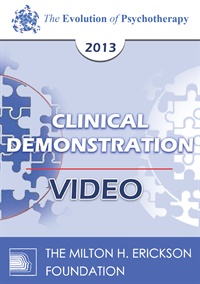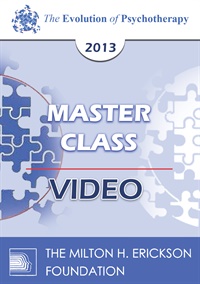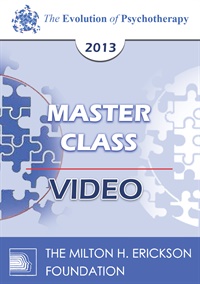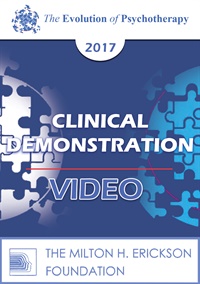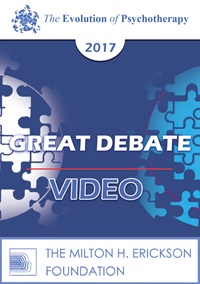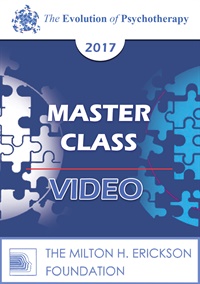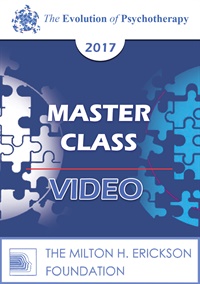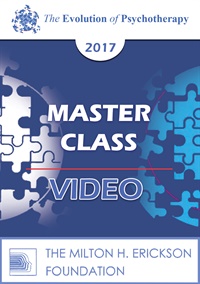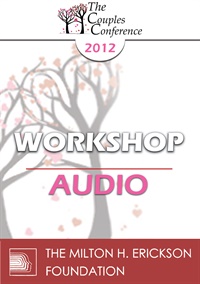
- Average Rating:
- Not yet rated
- Topic Areas:
- Workshops | Couples Therapy | Experiential Therapy
- Categories:
- Couples Conference | Couples Conference 2012
- Faculty:
- Rick Hanson, PhD
- Duration:
- 1:55:51
- Format:
- Audio Only
- Original Program Date:
- Apr 29, 2012
- Short Description:
- Building on the keynote on “taking in the good,” we’ll explore ways to use positive experiences to soothe and potentially replace negative material (e.g., relationship upsets, pain from childhood). Through discussion and experiential activities, we’ll match healing experiences to disturbances in the brain’s core motivational systems (Avoid harm, Approach reward, Attach to “us”).
- Price:
- $15.00 - Base Price
Tags: Couples Therapy Experiential
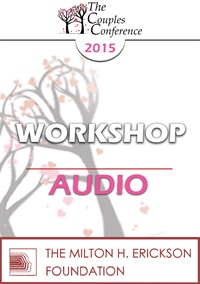
- Average Rating:
- Not yet rated
- Topic Areas:
- Couples Therapy | Workshops | Experiential Therapy | Brief Therapy | Ericksonian Hypnosis and Therapy Techniques
- Categories:
- Couples Conference | Couples Conference 2015
- Faculty:
- Jeffrey Zeig, PhD
- Duration:
- 1:49:31
- Format:
- Audio Only
- Original Program Date:
- Apr 26, 2015
- Short Description:
- Milton Erickson was one of the earliest people to work in Brief Therapy model with couples. This workshop will describe advanced advantages of using experiential methods with couples, including enactment technique and sculpting, lecture, demonstration, and small group practice.
- Price:
- $15.00 - Base Price
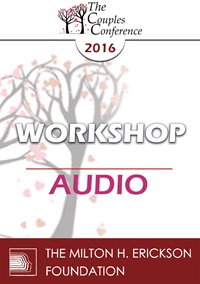
- Average Rating:
- Not yet rated
- Topic Areas:
- Neuroscience | Attachment | Workshops | Experiential Therapy | Mindfulness | Couples Therapy
- Categories:
- Couples Conference | Couples Conference 2016
- Faculty:
- Rob Fisher, MFT
- Duration:
- 01:54:14
- Format:
- Audio Only
- Original Program Date:
- May 13, 2016
- Short Description:
- Now that you understand the neuropsychology of attachment, how are you going to use it in a session where one partner is yelling at the other for abandoning him/her who is in turn trying to take refuge under the coach? Learn how to put theory into practice using an experiential approach to explore old neural circuitry around attachment and build new pathways. We will be using the present moment and mindfulness integrated into therapy to slow things down and rewire the brain.
- Price:
- $15.00 - Base Price
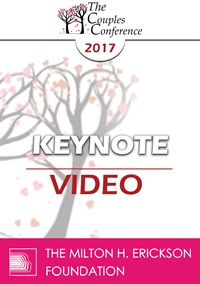
- Average Rating:
- Not yet rated
- Topic Areas:
- Couples Therapy | Keynotes | Experiential Therapy | Evocative Communication | Metaphors
- Categories:
- Couples Conference | Couples Conference 2017
- Faculty:
- Jeffrey Zeig, PhD
- Course Levels:
- Master Degree or Higher in Health-Related Field
- Duration:
- 55:49
- Format:
- Audio and Video
- Original Program Date:
- Mar 31, 2017
- Short Description:
- When information and advice fail to promote change, an experiential approach can foster adaptive realizations. Learn nonverbal and metaphoric methods to enliven your approach.
- Price:
-
Sale is $29.00
price reduced from Base Price - $59.00

- Average Rating:
- Not yet rated
- Topic Areas:
- Couples Therapy | Keynotes | Experiential Therapy | Metaphors | Evocative Communication
- Categories:
- Couples Conference | Couples Conference 2017
- Faculty:
- Jeffrey Zeig, PhD
- Duration:
- 55:49
- Format:
- Audio Only
- Original Program Date:
- Mar 31, 2017
- Short Description:
- When information and advice fail to promote change, an experiential approach can foster adaptive realizations. Learn nonverbal and metaphoric methods to enliven your approach.
- Price:
- $15.00 - Base Price
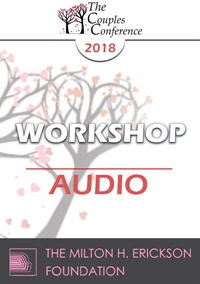
- Average Rating:
- Not yet rated
- Topic Areas:
- Couples Therapy | Workshops | Developmental Therapy Model | Experiential Therapy
- Categories:
- Couples Conference | Couples Conference 2018 | Pioneers in Couples and Family Therapy
- Faculty:
- Ellyn Bader, PhD | Sue Diamond, MA, RCC
- Duration:
- 1:59:27
- Format:
- Audio Only
- Original Program Date:
- May 06, 2018
- Short Description:
- This workshop is designed for couple’s therapists who have trained in the Developmental Model of Couples Therapy. Increase your skills in effective confrontation and incisive resolution of intrapsychic conflicts. Bring some of your toughest challenges and join Ellyn Bader and Sue Diamond-Potts to strengthen your ability to confront and transform those unrelenting couples’ impasses.
- Price:
- $15.00 - Base Price
- Average Rating:
- Not yet rated
- Topic Areas:
- Workshops | Couples Therapy | Developmental Therapy Model | Experiential Therapy
- Bundle(s):
- CC19 Main Conference Video Bundle
- Categories:
- Couples Conference | Couples Conference 2019 | Pioneers in Couples and Family Therapy
- Faculty:
- Ellyn Bader, PhD
- Course Levels:
- Master Degree or Higher in Health-Related Field
- Duration:
- 1:47:01
- Format:
- Audio and Video
- Original Program Date:
- Apr 14, 2019
- Short Description:
- This advanced workshop is designed to demonstrate core concepts of The Developmental Model of Couples Therapy. Participants will Increase their skills in the Initiator-Inquirer process and in effective confrontation and incisive resolution of intrapsychic conflicts. Join Ellyn Bader and learn how to make developmental assists, strengthen your confrontation skills and promote couples development.
- Price:
-
Sale is $29.00
price reduced from Base Price - $59.00
Credit available - Click Here for more information
- Average Rating:
- Not yet rated
- Topic Areas:
- Milton Erickson | Sex and Sexuality | Ericksonian Hypnosis and Therapy Techniques | Experiential Therapy | Storytelling | Strategic Therapy | Hypnosis
- Categories:
- Erickson Materials | Erickson Streaming Video Collection | Milton H. Erickson Collections | Online Continuing Education
- Faculty:
- Jeffrey Zeig, PhD | Milton H. Erickson, MD
- Course Levels:
- Master Degree or Higher in Health-Related Field
- Duration:
- 1 Hour 8 Minutes
- Format:
- Audio and Video
- Original Program Date:
- Sep 24, 2020
- Short Description:
- In Part 2 of Dr. Erickson’s Orientation to Sexual Development, Milton Erickson continues his interesting lecture about the natural developmental processes involved with sexual/relational maturity. This video begins with Erickson telling charming stories of his sons sexually and relationally developing, which illustrate the principles outlined in the video.
- Price:
- $19.95 - Base Price

- Average Rating:
- Not yet rated
- Topic Areas:
- Invited Addresses | Psychotherapy | Experiential Therapy | Humanistic Therapy
- Categories:
- Evolution of Psychotherapy | Evolution of Psychotherapy 2000
- Faculty:
- James Bugental, PhD | Mary Goulding, MSW
- Duration:
- 1 Hour 21 Minutes
- Format:
- Audio Only
- Original Program Date:
- May 25, 2000
- Short Description:
- Psychotherapy is not a technique to apply but a living encounter to enter. In this reflective address, the speaker challenges therapists to shift from analyzing clients to engaging their immediate, subjective experience in the present moment. Through demonstration, clinical dialogue, and personal reflection, he explores how genuine presence, emotional risk, and attention to “what is happening now” create the conditions for lasting change.
- Price:
- $15.00 - Base Price
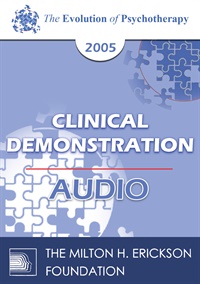
- Average Rating:
- Not yet rated
- Topic Areas:
- Clinical Demonstrations | Experiential Therapy | Psychotherapy | Treatment Planning | Therapist Development
- Categories:
- Evolution of Psychotherapy | Evolution of Psychotherapy 2005
- Faculty:
- Jeffrey Zeig, PhD
- Duration:
- 48 Minutes
- Format:
- Audio Only
- Original Program Date:
- Dec 09, 2005
- Short Description:
- Educational Objectives: To list three experiential methods in the demonstration. Given a patient, propose an experiential treatment plan to elicit change.
- Price:
- $15.00 - Base Price
- Average Rating:
- Not yet rated
- Topic Areas:
- Workshops | Art and Creativity | Psychotherapy | Experiential Therapy
- Categories:
- Evolution of Psychotherapy | Evolution of Psychotherapy 2005
- Faculty:
- Jean Houston, PhD
- Course Levels:
- Master Degree or Higher in Health-Related Field
- Duration:
- 2:56:39
- Format:
- Audio and Video
- Original Program Date:
- Dec 07, 2005
- Short Description:
- The field of Social Artistry is emerging to meet the crises in this time of whole system transition and global change affecting every aspect of our lives. During this workshop we bring a number of the experiential techniques for developing human capacities together with the growing body of knowledge about innovative solutions to create highly trained and skilled individuals able to provide leadership for effective social change.
- Price:
-
Sale is $29.00
price reduced from Base Price - $59.00
- Average Rating:
- Not yet rated
- Topic Areas:
- Clinical Demonstrations | Experiential Therapy | Psychotherapy | Therapist Development | Treatment Planning
- Categories:
- Evolution of Psychotherapy | Evolution of Psychotherapy 2009
- Faculty:
- Jeffrey Zeig, PhD
- Course Levels:
- Master Degree or Higher in Health-Related Field
- Duration:
- 58:41
- Format:
- Audio and Video
- Original Program Date:
- Dec 11, 2009
- Short Description:
- EP09 Clinical Demonstration 01 - Essentials of Experiential Therapy - Jeffrey Zeig, PhD
- Price:
-
Sale is $29.00
price reduced from Base Price - $59.00
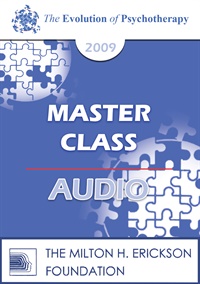
- Average Rating:
- Not yet rated
- Topic Areas:
- Brief Therapy | Experiential Therapy | Gestalt | Hypnosis | Psychotherapy | Ericksonian Hypnosis and Therapy Techniques | Hypnotherapy | Master Classes
- Categories:
- Evolution of Psychotherapy | Evolution of Psychotherapy 2009
- Faculty:
- Jeffrey Zeig, PhD | Erving Polster, PhD
- Duration:
- 2 Hours 49 Minutes
- Format:
- Audio Only
- Original Program Date:
- Dec 14, 2009
- Short Description:
- Gestalt therapy and Ericksonian hypnotherapy are experiential methods of change. In Combination they can be synergistic. Psychotherapy is best when clients have a first hand experience of an alive therapeutic process. Such dynamic empowering experiences pave the way for dynamic understandings. Drs. Polster and Zeig will engage with each other and the participants to examine commonalities and differences in their work.
- Price:
- $15.00 - Base Price
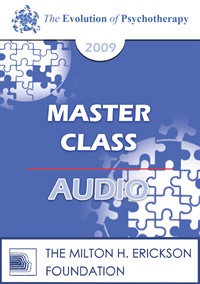
- Average Rating:
- Not yet rated
- Topic Areas:
- Brief Therapy | Experiential Therapy | Gestalt | Hypnosis | Ericksonian Hypnosis and Therapy Techniques | Hypnotherapy | Master Classes | Psychotherapy
- Categories:
- Evolution of Psychotherapy | Evolution of Psychotherapy 2009
- Faculty:
- Jeffrey Zeig, PhD | Erving Polster, PhD
- Duration:
- 2 Hours 42 Minutes
- Format:
- Audio Only
- Original Program Date:
- Dec 14, 2009
- Short Description:
- Gestalt therapy and Ericksonian hypnotherapy are experiential methods of change. In Combination they can be synergistic. Psychotherapy is best when clients have a first hand experience of an alive therapeutic process. Such dynamic empowering experiences pave the way for dynamic understandings. Drs. Polster and Zeig will engage with each other and the participants to examine commonalities and differences in their work.
- Price:
- $15.00 - Base Price
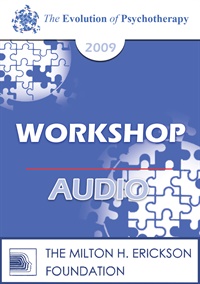
- Average Rating:
- Not yet rated
- Topic Areas:
- Depression | Workshops | Hypnosis | Experiential Therapy | Psychotherapy | Strategic Therapy
- Categories:
- Evolution of Psychotherapy | Evolution of Psychotherapy 2009
- Faculty:
- Michael Yapko, PhD
- Duration:
- 2 Hours 42 Minutes
- Format:
- Audio Only
- Original Program Date:
- Dec 09, 2009
- Short Description:
- This session explores how hypnosis and psychotherapy can offer powerful alternatives to the biomedical model of treating depression. Michael Yapko shows how strengthening relationships, building coping skills, and fostering emotional regulation can create lasting change. Participants learn goal-oriented approaches that emphasize prevention, flexibility, and social connection as essential ingredients in recovery.
- Price:
- $15.00 - Base Price
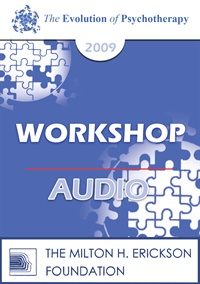
- Average Rating:
- Not yet rated
- Topic Areas:
- Psychotherapy | Workshops | Art and Creativity | Experiential Therapy | Therapist Development
- Categories:
- Evolution of Psychotherapy | Evolution of Psychotherapy 2009
- Faculty:
- Jeffrey Zeig, PhD
- Duration:
- 1 Hour 51 Minutes
- Format:
- Audio Only
- Original Program Date:
- Dec 10, 2009
- Short Description:
- Experiential methods enliven therapy through dynamic experiences that promote dynamic realizations. We will explore methods that make therapy a visual art, recognizing the visual realizations are neurologically encoded more robustly than words, hence more easily accessed when needed. We will explore the use of gestures, objects, and even sounds to empower change. We will learn the latest advances in therapist sculpting. Lecture, demonstration, and small group exercises will be used
- Price:
- $15.00 - Base Price
- Average Rating:
- Not yet rated
- Topic Areas:
- Clinical Demonstrations | Experiential Therapy | Psychotherapy
- Categories:
- Evolution of Psychotherapy | Evolution of Psychotherapy 2013
- Faculty:
- Jeffrey Zeig, PhD
- Course Levels:
- Master Degree or Higher in Health-Related Field
- Duration:
- 52:01
- Format:
- Audio and Video
- Original Program Date:
- Dec 13, 2013
- Short Description:
- Psychotherapy is a symbolic drama of change, the imperative of which is: “by living this experience you will be different.”
- Price:
-
Sale is $29.00
price reduced from Base Price - $59.00
Tags: Experiential Psychotherapy
- Average Rating:
- Not yet rated
- Topic Areas:
- Clinical Demonstrations | Hypnosis | Experiential Therapy | Psychotherapy
- Categories:
- Evolution of Psychotherapy | Evolution of Psychotherapy 2013
- Faculty:
- Michael Yapko, PhD
- Course Levels:
- Master Degree or Higher in Health-Related Field
- Duration:
- 1:04:47
- Format:
- Audio and Video
- Original Program Date:
- Dec 13, 2013
- Short Description:
- In this live demonstration, hypnosis becomes a pathway for transforming trust and self-reliance. A volunteer explores her difficulty depending on others, discovering instead the deeper security of trusting her own capacity to cope. Through carefully guided suggestions and experiential shifts, the session shows how reframing expectations of others can foster greater acceptance, resilience, and more ease in relationships.
- Price:
-
Sale is $29.00
price reduced from Base Price - $59.00
- Average Rating:
- Not yet rated
- Topic Areas:
- Master Classes | Brief Therapy | Experiential Therapy | Gestalt | Hypnosis | Psychotherapy
- Categories:
- Evolution of Psychotherapy | Evolution of Psychotherapy 2013
- Faculty:
- Jeffrey Zeig, PhD | Erving Polster, PhD
- Course Levels:
- Master Degree or Higher in Health-Related Field
- Duration:
- 2:34:54
- Format:
- Audio and Video
- Original Program Date:
- Dec 16, 2013
- Short Description:
- Gestalt therapy and Ericksonian hypnotherapy are experiential methods of change. In combination they can be synergistic. Psychotherapy is best when clients have a first-hand experience of an alive therapeutic process. Such dynamic empowering experiences pave the way for dynamic understandings. Drs. Polster and Zeig will engage with each other and the participants to examine commonalities and differences in their work.
- Price:
-
Sale is $29.00
price reduced from Base Price - $59.00
- Average Rating:
- Not yet rated
- Topic Areas:
- Master Classes | Brief Therapy | Experiential Therapy | Gestalt | Hypnosis | Psychotherapy
- Categories:
- Evolution of Psychotherapy | Evolution of Psychotherapy 2013
- Faculty:
- Jeffrey Zeig, PhD | Erving Polster, PhD
- Course Levels:
- Master Degree or Higher in Health-Related Field
- Duration:
- 2:28:01
- Format:
- Audio and Video
- Original Program Date:
- Dec 16, 2013
- Short Description:
- Gestalt therapy and Ericksonian hypnotherapy are experiential methods of change. In combination they can be synergistic. Psychotherapy is best when clients have a first-hand experience of an alive therapeutic process. Such dynamic empowering experiences pave the way for dynamic understandings. Drs. Polster and Zeig will engage with each other and the participants to examine commonalities and differences in their work.
- Price:
-
Sale is $29.00
price reduced from Base Price - $59.00
Credit available - Click Here for more information
- Average Rating:
- Not yet rated
- Topic Areas:
- Clinical Demonstrations with Discussant | Psychotherapy | Evocative Communication | Brief Therapy | Ericksonian Psychotherapy | Ericksonian Hypnosis and Therapy Techniques | Experiential Therapy | Strategic Therapy
- Bundle(s):
- Learning Track - EP17 Erickson Stream
- Categories:
- Evolution of Psychotherapy | Evolution of Psychotherapy 2017 | Evolution of Psychotherapy Erickson Learning Track | Online Continuing Education
- Faculty:
- Jeffrey Zeig, PhD | Otto Kernberg, MD
- Course Levels:
- Master Degree or Higher in Health-Related Field
- Duration:
- 1:24:21
- Format:
- Audio and Video
- Original Program Date:
- Dec 14, 2017
- Short Description:
- Experiential components central to brief, strategic approaches to psychotherapy. We will compare and contrast Ericksonian and psychodynamic perspectives.
- Price:
-
Sale is $29.00
price reduced from Base Price - $59.00
Credit available - Click Here for more information
- Average Rating:
- Not yet rated
- Topic Areas:
- Great Debates | Cognitive Behavior Therapy (CBT) | Experiential Therapy | Psychotherapy
- Bundle(s):
- Learning Track - EP17 CBT Stream | Learning Track - EP17 Erickson Stream
- Categories:
- Evolution of Psychotherapy | Evolution of Psychotherapy 2017 | Evolution of Psychotherapy CBT Learning Track | Evolution of Psychotherapy Erickson Learning Track | Online Continuing Education
- Faculty:
- Stephen Gilligan, PhD | Donald Meichenbaum, PhD
- Course Levels:
- Master Degree or Higher in Health-Related Field
- Duration:
- 1:19:30
- Format:
- Audio and Video
- Original Program Date:
- Dec 14, 2017
- Short Description:
- This exchange will focus on the classic question of whether good therapy should focus more on cognitive or experiential changes. The merits of each, and the possibility of a “both/and” partnership, are considered.
- Price:
-
Sale is $29.00
price reduced from Base Price - $59.00
Credit available - Click Here for more information
- Average Rating:
- Not yet rated
- Topic Areas:
- Master Classes | Psychotherapy | Experiential Therapy | Gestalt | Hypnosis
- Bundle(s):
- Learning Track - EP17 Psychotherapy Stream | Learning Track - EP17 Erickson Stream
- Categories:
- Evolution of Psychotherapy | Evolution of Psychotherapy 2017 | Evolution of Psychotherapy Erickson Learning Track | Evolution of Psychotherapy Psychotherapy Learning Track | Online Continuing Education
- Faculty:
- Erving Polster, PhD | Jeffrey Zeig, PhD
- Course Levels:
- Master Degree or Higher in Health-Related Field
- Duration:
- 1:24:19
- Format:
- Audio and Video
- Original Program Date:
- Dec 18, 2017
- Short Description:
- Part 1 of 3. Gestalt therapy and Ericksonian hypnotherapy are experiential methods of change. In combination they can be synergistic. Psychotherapy is best when clients have a first-hand experience of an alive therapeutic process. Such dynamic empowering experiences pave the way for dynamic understandings. Drs. Polster and Zeig will engage with each other and the participants to examine commonalities and differences in their work.
- Price:
-
Sale is $29.00
price reduced from Base Price - $59.00
Credit available - Click Here for more information
- Average Rating:
- Not yet rated
- Topic Areas:
- Master Classes | Psychotherapy | Experiential Therapy | Gestalt | Hypnosis
- Bundle(s):
- Learning Track - EP17 Psychotherapy Stream | Learning Track - EP17 Erickson Stream
- Categories:
- Evolution of Psychotherapy | Evolution of Psychotherapy 2017 | Evolution of Psychotherapy Erickson Learning Track | Evolution of Psychotherapy Psychotherapy Learning Track | Online Continuing Education
- Faculty:
- Erving Polster, PhD | Jeffrey Zeig, PhD
- Course Levels:
- Master Degree or Higher in Health-Related Field
- Duration:
- 1:17:56
- Format:
- Audio and Video
- Original Program Date:
- Dec 18, 2017
- Short Description:
- Part 2 of 3. Gestalt therapy and Ericksonian hypnotherapy are experiential methods of change. In combination they can be synergistic. Psychotherapy is best when clients have a first-hand experience of an alive therapeutic process. Such dynamic empowering experiences pave the way for dynamic understandings. Drs. Polster and Zeig will engage with each other and the participants to examine commonalities and differences in their work.
- Price:
-
Sale is $29.00
price reduced from Base Price - $59.00
Credit available - Click Here for more information
- Average Rating:
- Not yet rated
- Topic Areas:
- Master Classes | Experiential Therapy | Gestalt | Hypnosis | Psychotherapy
- Categories:
- Evolution of Psychotherapy | Evolution of Psychotherapy 2017 | Online Continuing Education
- Faculty:
- Jeffrey Zeig, PhD | Erving Polster, PhD
- Course Levels:
- Master Degree or Higher in Health-Related Field
- Duration:
- 2:33:42
- Format:
- Audio and Video
- Original Program Date:
- Dec 18, 2017
- Short Description:
- Part 3 of 3. Gestalt therapy and Ericksonian hypnotherapy are experiential methods of change. In combination they can be synergistic. Psychotherapy is best when clients have a first-hand experience of an alive therapeutic process. Such dynamic empowering experiences pave the way for dynamic understandings. Drs. Polster and Zeig will engage with each other and the participants to examine commonalities and differences in their work.
- Price:
-
Sale is $29.00
price reduced from Base Price - $59.00


